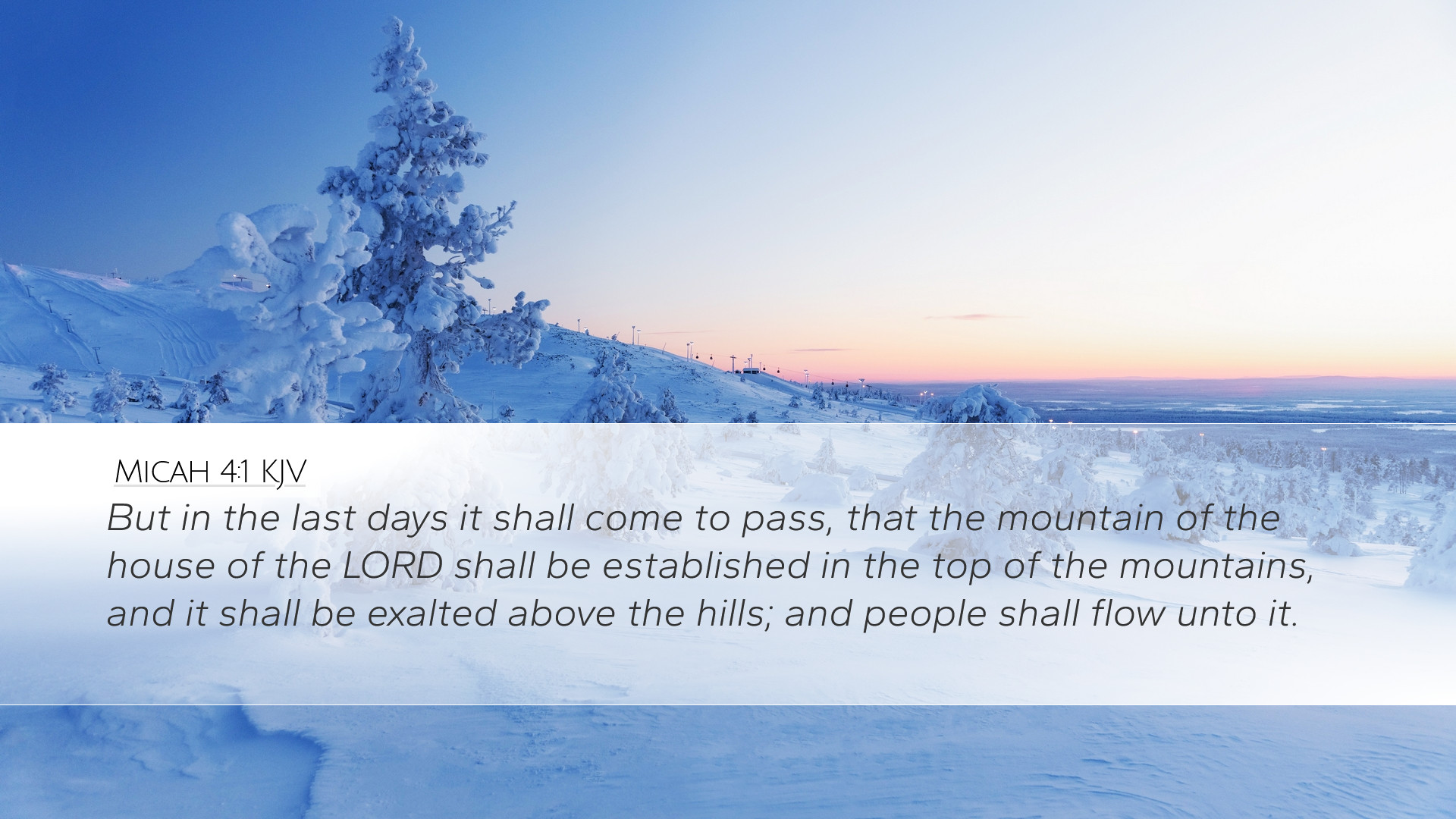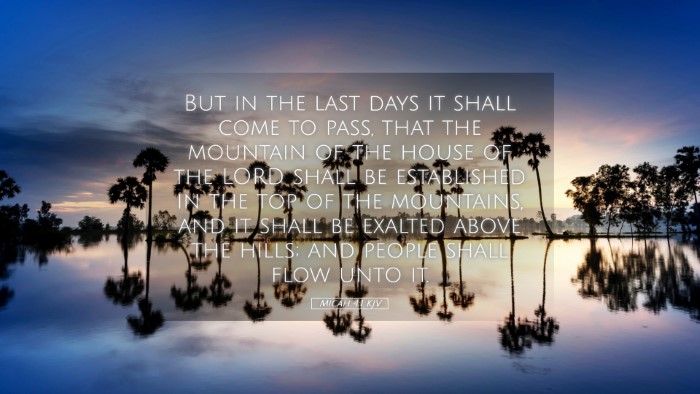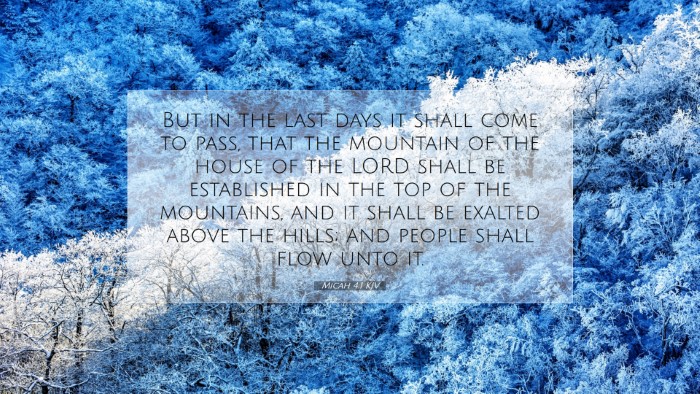Old Testament
Genesis Exodus Leviticus Numbers Deuteronomy Joshua Judges Ruth 1 Samuel 2 Samuel 1 Kings 2 Kings 1 Chronicles 2 Chronicles Ezra Nehemiah Esther Job Psalms Proverbs Ecclesiastes Song of Solomon Isaiah Jeremiah Lamentations Ezekiel Daniel Hosea Joel Amos Obadiah Jonah Micah Nahum Habakkuk Zephaniah Haggai Zechariah MalachiMicah 4:1
Micah 4:1 KJV
But in the last days it shall come to pass, that the mountain of the house of the LORD shall be established in the top of the mountains, and it shall be exalted above the hills; and people shall flow unto it.
Micah 4:1 Bible Commentary
Commentary on Micah 4:1
Bible Verse: Micah 4:1 - "But in the last days it shall come to pass, that the mountain of the house of the Lord shall be established in the top of the mountains; and it shall be exalted above the hills; and people shall flow unto it."
Introduction
This verse from the book of Micah encapsulates a profound prophecy regarding the ultimate reign of God's kingdom. In times of turmoil and oppression, Micah delivers a message of hope that anticipates a future where the presence of the Lord will be central to humanity. This commentary synthesizes insights from notable public domain theologians such as Matthew Henry, Albert Barnes, and Adam Clarke.
Contextual Overview
Micah prophesied during a period of great social injustice and spiritual decline in Israel and Judah. His messages oscillate between dire warnings of impending judgment and bright proclamations of hope and restoration. Chapter 4 marks a significant turn towards the latter, expressing a vision of future glory for Zion.
The Last Days
Matthew Henry emphasizes that the phrase “in the last days” signifies a time beyond the immediate context of Micah’s audience. It points towards the messianic age, embodying the fulfillment of God’s redemptive plan through Christ. This concept is crucial for understanding the eschatological implications of Micah’s prophecy.
Albert Barnes notes that the prophetic vision expands to a time when the full realization of God's kingdom is at hand, suggesting an era marked by peace and divine governance where “the mountain of the house of the Lord” will prevail.
The Mountain of the House of the Lord
This metaphor signifies both a physical place and a spiritual reality. The “mountain” symbolizes strength and stability. Adam Clarke states that this mountain refers to Mount Zion, representing the presence of God among His people.
- Spiritual Significance: The exaltation of this mountain aligns with the idea of God's supremacy over all nations—a theme echoed throughout the Scriptures.
- Prophetic Imagery: The mention of “the top of the mountains” suggests a divine hierarchy where God's kingdom will be acknowledged above all nations and powers.
Exalted Above the Hills
Continuing from the previous metaphor, the hills represent lesser nations or powers. Matthew Henry interprets this exaltation as both a literal and figurative lifting of God's people above their oppressors and rivals, establishing God’s sovereignty.
Albert Barnes elaborates that this exaltation signifies a turning point where the people of God will no longer be viewed as weak but rather as the chosen vessels through which divine blessings flow to the world.
People Shall Flow Unto It
The imagery of people flowing towards God’s mountain conveys an irresistible draw toward divine truth and grace. Adam Clarke highlights this as a prophetic vision of the nations being attracted to the presence of God, fulfilling the Abrahamic covenant of being a blessing to all nations.
- Universal Relevance: The prophecy underlines the universal scope of God’s plan for salvation, as confirmed in the New Testament (e.g., Matthew 28:19).
- Fulfillment in Christ: This drawing of people fulfills its ultimate expression in Jesus Christ, who invites all to come to Him and find rest (Matthew 11:28).
Theological Implications
The exhortation in Micah 4:1 encapsulates several key theological themes relevant for today’s church and society:
- Hope and Restoration: The promise of restoration amidst chaos offers hope to believers facing contemporary societal challenges.
- The Kingdom of God: This verse serves as a reminder that God’s kingdom will not be established by human effort but by divine action, emphasizing our need for reliance on His grace.
- Calling to the Nations: The call for all people to flow to the mountain signifies the church's mission to engage and draw others into the knowledge of God.
Conclusion
Micah 4:1 is a profound prophecy that encapsulates the heart of God's plan for humanity through the ages. Drawing from the insights of ancient commentators, we are reminded of our calling to participate in God's redemptive work while anchoring our hope in His promises. The ultimate establishment of God's kingdom calls us to live in anticipation, inviting others to join in the movement towards His holy mountain where peace and righteousness reign.


